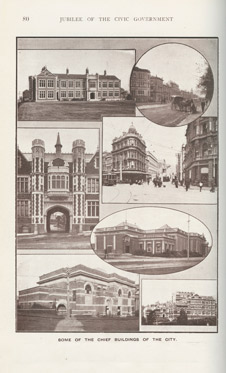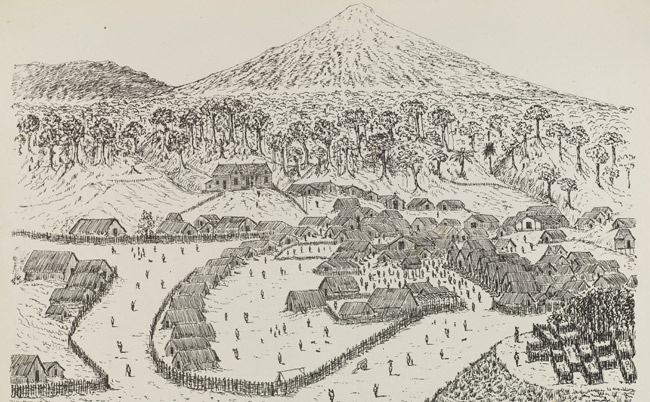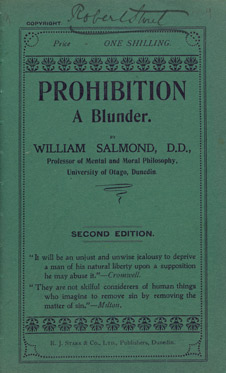Wednesday 6 March 2019 11:44am

City of Dunedin, New Zealand: Jubilee of the civic government, 1865-1915: Celebrated on 1st 2nd, & 4th August 1915. (1915). Dunedin: Dunedin City Council. Hocken Collections.
A collection of pamphlets dating back to 1793, covering topics as far-ranging as palaeontology to Māori land judgements, has been catalogued and rehoused at the University’s Hocken Library.
The pamphlets were donated by Sir Frederick Revans Chapman in 1936, along with a collection of books and archives. The annual report at the time noted the donation as being “the most important benefaction since Dr Hocken’s foundation gift arrived”.
Hocken Librarian Sharon Dell says the Chapman Collection provides a fascinating insight into 19th and early 20th century New Zealand.
The 1,630 items, over 109 bound volumes, range in date from 1793 to 1932 and reflect the broad interests of Sir Frederick and his father Henry, who began the collection.
Ms Dell says pamphlets form a unique place in New Zealand’s written record.
“As printing presses arrived in New Zealand’s growing settlements, they provided an inexpensive means of producing these small, unbound booklets that focused on single subjects.
“Semi-ephemeral in nature, such large collections of this kind of material are rare,” she says.
While only around 5 to 10 per cent of the individual items are unique to the Hocken, the collection is significant in that it draws together a cross section of titles relating to 19th and early 20th century life in New Zealand.
Sir Frederick, a keen amateur scientist, collected four reports on the Tarawera volcanic explosion of 1886, along with pamphlets on palaeontology by Augustus Hamilton and James Park, and one on the anatomy of the Kiwi by Jeffrey Parker.

Ledger, J. (1882). Pen and ink sketches of Parihaka and neighbourhood: With scenes of Maori life. Dunedin: Fergusson & Mitchell. Hocken Collections..
Extensive evidence of his legal interests is evident in collections of judgments relating to Māori land and records of court cases, while catalogues, annual reports and works containing statistical data give solid information about the economic and social circumstances of the colonists.
The pamphlets are also full of photographs and maps and provide a useful background to people and events for a wide range of researchers.
“The pamphlets give a window on the issues that motivated New Zealanders in the first century of the country’s development and the social attitudes that influenced their behaviour,” Ms Dell says.
“They provide a rich source of content for researchers with first-hand evidence of the economic and social conditions of the people of that time.”
Head Curator Publications Peter Sime says pamphlets were the way public conversations were conducted at the time, much like blogging and tweeting of today.

Salmond, W. (1911). Prohibition: A blunder (2nd ed.). Dunedin: R.J. Stark &. Co. Hocken Collections.
“An early version of a ‘Twitter storm’ can be seen in volume 49 of the collection. Amongst some religious pamphlets is Prohibition, a blunder by William Salmond (1911) together with counterarguments from A.S. Adams in Professor Salmond's blunder: prohibition, an effective social reform: a reply and A.R. Atkinson’s The drink traffic, a blunder: a reply to Professor Salmond,” he says.
As was customary, the Chapmans bound these small publications into volumes which presented challenges for the cataloguing practices of today.
A project to record and rehouse the collection was recently completed, opening it up for the public to access and study.
The work demanded the expertise of specialist cataloguer Paul Barton, from the Library’s Information Resources team, who worked on site at the Hocken over several months.
Each individual pamphlet now has a detailed catalogue record and full subject analysis so researchers can more easily discover them.
The specialist skills of the Library’s bindery staff were used to construct custom-made boxes to house and protect each of the volumes.
Highlights Mr Barton came across during his work include Scenery-preservation: report for the year ended ... New Zealand, Department of Lands. 1907, which “had some wonderful scenes of the impact on the bush of the construction of the main trunk railway through the centre of the North Island”; and Special report of Gas Committee: 11th February, 1884, based on an interesting dispute between the new manager of the Dunedin Gas Works and some of the long-serving staff.
Sir Frederick (1849 – 1936) was one of the new generation of colonists who were actually born in New Zealand.
Born in Wellington and educated in Melbourne, he studied law in England before returning to Dunedin to practise.
He helped establish the University of Otago’s Faculty of Law and became the first New Zealand-born judge in 1903. Retiring from the bench in 1921, he maintained an association with the University, Otago Museum, the Hocken Collections, and the Turnbull Library.
